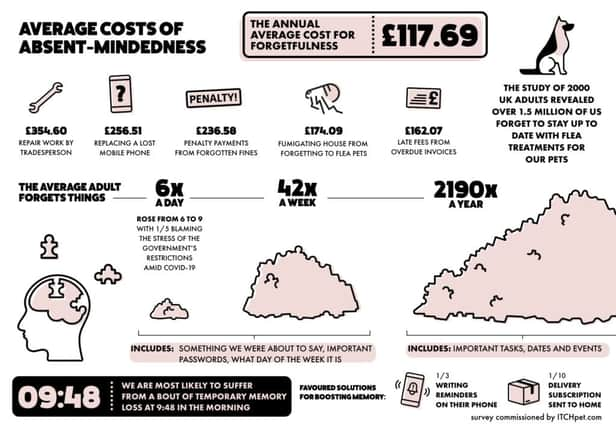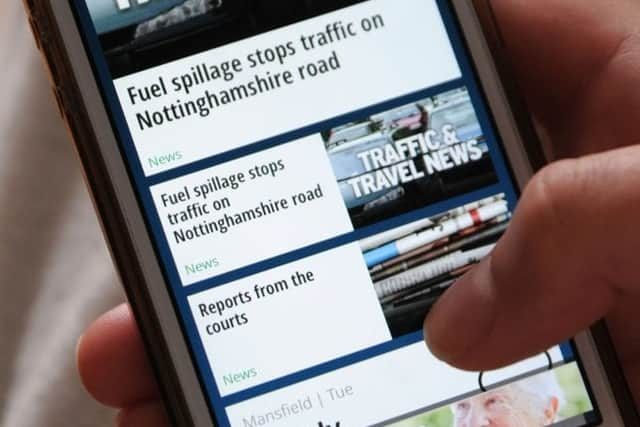Forgetful? You’re not alone - memory loss hits millions!


Being forgetful is not unique
First day of every week is known as Blank Monday ... the day of the week when we are most likely to suffer from memory loss, according to new research.
Research has revealed that round 5.2 million - or one in ten - of us will forget important dates, tasks or events as we struggle to get back into the swing of things after a relaxing weekend.
Advertisement
Hide AdAdvertisement
Hide AdAnd 9.48am is the time when our minds are most likely to be full of fog.
The study also found six things slip our minds every day on average - or 42 times a week! Topping the list are something we were about to say, an important password and even what day of the week it is.
Forgetfulness became more prevalent during lockdown it emerged, when the daily total of forgotten days, dates and times rose from six to nine, with one in five (20 per cent) blaming the stress of the government’s restrictions amid the COVID-19 pandemic.
Of the 2,190 things we frequently forget to do each year, picking up an item we went to the supermarket for, struggling to recall where we left our mobile phone or remembering the name of someone we’ve known for years were some of the biggest culprits.
Advertisement
Hide AdAdvertisement
Hide AdAnimals and kids often pay the price for our absent-mindedness too, according to the report commissioned by pet wellbeing firm, ITCHpet.com.
The research of 2,000 Britons revealed around 1.5m of us forget to stay up to date with flea treatments for our furry friends, while a similar number of parents confessed they forgot their kids Zoom lessons and deadlines for submitting homework during quarantine.
Speaking about the results, Harley Street-based psychologist, Dr Becky Spelman, said: “We live in a frenetic world with a cocktail of factors influencing our cognitive function, whether it’s high pressure jobs, the demands of parenting or caring for pets already putting pressure on our memories.
“Add a global pandemic to the mix and it’s not surprising things have fallen by the wayside further. COVID-19 has turned our day to day routines on their heads. This lack of control has elevated our stress levels, which in turn affects our ability to recall information, dates and details.”
Advertisement
Hide AdAdvertisement
Hide AdA spokesperson from ITCHpet.com, who commissioned the research, said: “With so many commitments and external distractions in our day to day lives, remembering to treat our pets for parasites can easily slip the mind.
“The effect of forgetfulness can impact the health and wellbeing of our four-legged friends, who can suffer as a result.”


Britain’s Top 30 Memory Lapse List: 1. What day of the week it is; 2. Something I was going to say; 3. Items at the supermarket; 4. Passwords; 5. Where I left my mobile phone; 6. Someone’s name; 7. To defrost something for dinner; 8. Taking medication; 9. Calling a friend/relative; 10. Brushing my teeth. Others include: 11. Where I left my wallet; 12. Where I put my bank/credit card; 13. Birthdays of nearest and dearest; 14. Where I left the car keys; 15. Locking the doors at night; 16. PIN number; 17. Where I parked the car; 18. A work call; 19. Feeding the pet; 20. Hospital or doctor’s appointment. Further ones include: 21. Leaving the bath/tap running; 22. Renew/pay for insurance (house, car, travel); 23. Giving the pet medication, such as flea and worming treatments; 24. To scan and send your child’s schoolwork to the teacher; 25. To put on underwear; 26. Own anniversary; 27. Paying a fine; 28. Vets appointment; 29. To get my child on a live school lesson; 30. To pick up my child (ie from school an activity, a friend’s house).
DR BECKY SPELMAN’S TOP TIPS ON HOW TO HELP IMPROVE YOUR MEMORY
Food for thought
It’s understood that cognitive function can be influenced through diet, as there are certain nutrients from foods which can boost memory function. These include the likes of antioxidants (think blueberries), good fats such as omega-3 (found in oily fish and walnuts) and a range of vitamins and minerals - including vitamin K (green vegetables). Also look to minimise sugar and alcohol intake - as elevated glucose in the bloodstream can result in memory deficit.
Advertisement
Hide AdAdvertisement
Hide AdEating well is hugely important. This doesn’t mean you have to give up treats altogether - but rather that eating healthily should be your default. Swapping unhealthy snacks for healthier ones can have great benefits for one’s physical and mental health alike, and obviously reducing alcohol intake is always a good idea. While moderate consumption of alcohol may have some benefits, most drinkers underestimate their consumption levels.
Sort your sleep
Sleep is crucial when it comes to brain functionality. Researchers found that a lack of sleep impairs cognitive ability, such as focus and efficient learning, whereas catching those Z’s improves the retention of memory. Interestingly, the part of the brain that works to solidify memories from temporary to longer-term storage is activated when you’re sleeping. So, look to get your seven hours in.
Make sure you turn off your device and stay away from the television for a period of time before going to bed – ideally for at least an hour. The research shows that people who look at their phones or watch television just before going to bed take longer to go to sleep and have poorer quality sleep when they do. Instead, give your brain time to unwind.
Train your brain and go for games
Taking time to play games might feel like procrastination, however, like muscular strength, your brain can also be trained and all from the comfort of your couch. Video games can boost memory and could even reduce the risk of dementia. The likes of chess and sudoku can help to keep your brain in shape by enhancing overall cognitive ability - giving a valid and beneficial excuse for a games break.
Advertisement
Hide AdAdvertisement
Hide AdRather than playing on your own, play with someone else. The social contact - even if it is online and remote - is also good for your mental health and memory.
Use memory enhancing mnemonic devices
Mnemonic devices are clever memory techniques to help recall information. There are different variations, from phrases, acronyms, rhymes, songs and images etc., so look to find one which is right for you. For example, some people might prefer acronyms - where you create one word from the primary letters of what you need to remember, whereas others might like creating rhymes to help remember, or even using alliteration (where there is a sequence of similar sounds and syllables)
Some people also find it helpful to involve different senses. For example, we can associate a particular colour or smell with the information we want to remember. Everyone’s brains work in a different way, so this can be an extremely personalised way of optimising recall.
Delivery services
Sometimes we all need a little helping hand in life and setting up regular delivery services - whether it be medical prescriptions, food deliveries or parasite pet treatments - is a quick and convenient way of ensuring things are not forgotten. Furthermore, services of this nature also help to relieve the self-inflicted pressure which we put on ourselves, as the service remembers and delivers on our behalf.
Advertisement
Hide AdAdvertisement
Hide AdTry to set aside a particular day every week when you set up any delivery services you need. Remember that delivery workers deserve respect and consideration, too - if you know you won’t be in when they call, provide a reasonable alternative delivery method. And if you interact with the person delivering your items, remember to smile! You will both come away from the encounter happier.
Sketch to etch your memory
Creativity might just be the key when it comes to enhancing your memory. Researchers found that drawing can be a more effective method of retaining new information than rewriting notes. Also, when it comes to important past events, such as birthdays, graduations or holidays - as a society, we use cameras and videos to capture the moment and to cement that memory, whereas experts have advised that actually, drawing can be a powerful way to make those memories last longer
Pictograms are one of the oldest forms of written communication - and interestingly, now that we communicate so much online, pictograms - in the form of emojis and other graphic elements -are once again an important form of communication. If you feel that you are notterribly good at drawing, you could use emojis as a stand-in. Their visual element will have a similar psychological effect.